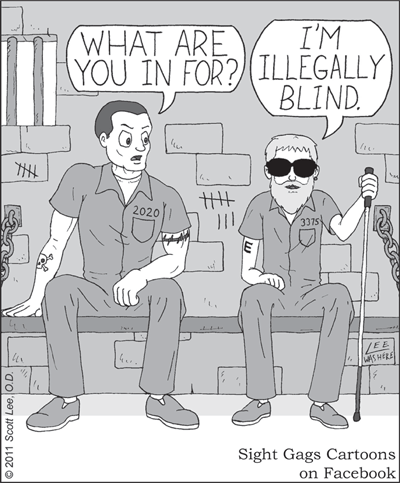Need More MPS Specifics
I got all excited as I started to read the article
“Does One Contact Lens Solution Fit All?” in Review of Cornea & Contact Lenses (May 2011) because I thought for sure this article would finally give us the specifics as to which solutions are most compatible with which contact lenses—but the article never did give specifics.
While I am not faulting this author alone, when will someone write the article that will list specific solutions and lenses that don’t go together? When will we see a chart or other easy-to-use guide to help us make these decisions? I realize such a chart would be based on current information and available products and would thus likely need updating annually or even more frequently...but it would be so very helpful!
—Alvin Stern, O.D.
Penns Grove, N.J.
Drinking Water Doesn’t Help Dry Eye
The June “Cornea + Contact Lens Q+A” (
“Dry Eye and the Urinary Tract”) contained some inaccuracies which, I have been assured by the editors, were due to failings in the editorial process. I am grateful to the editors for their honesty and willingness to set the record straight.
It was stated that Dr. Karpecki “disagreed” with my arguments that drinking water is of no value in treating dry eye and that we should stop advising our patients to drink more water for dry eye relief. Yet, the following statement that “There are no studies tied to water intake and dry eye” dramatically supports, rather than disagrees, with this position. In the absence of scientific and medical evidence, and with the knowledge that tear production is an active, rather than a passive, process uninfluenced by water intake, there is no merit in advising patients in this manner.
Sight Gags by Scott Lee, O.D.

While advising patients to drink more water is of no value in dry eye relief it may, as pointed out by both Drs. Karpecki and Kabat, be harmful to some patients. While Dr. Kabat wisely advocates the compilation of a good case history, we are all aware that this information may often be incomplete or misleading. Advising an obese diabetic to “get more exercise” seems like sound, simple advice until he succumbs to a concomitant cardiac condition that he didn’t report in his case history. It is incumbent upon us to be extremely careful not only to avoid giving patients useless advice but suggestions that might actually be harmful to their well-being.
It is also important to keep in mind that if our advice leads to adverse affects in another organ system, such advice might not be covered by our malpractice insurance. Our words are powerful and we must use them judiciously. We must be careful for our patients’ sakes and for our own.
—Mark S. Vogel, O.D.
Patchogue, N.Y.

